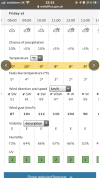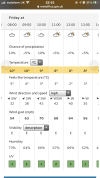This is what happened in the October 1987 storm and there was a lot of infrastructure and people in the way of that. Since then, sting jets have been researched and are far better understood and modelled. It is impressive to me that this storm and its potential impacts were being flagged up before the storm had even started to develop, which in a sense shows how far weather forecasting has come over the decades.
Motorways aren't so vulnerable as I don't think that many of them are lined with trees which are capable of coming down and completely blocking them at very short notice, and off the motorways, motor vehicle speeds are much lower than trains, which gives drivers (who drive by line of sight rather than relying on coloured lights to tell them a stretch of road ahead is clear) a better chance of avoiding crashing into fallen trees (
although it does happen, skip to 2:20). Railways do have sections which are lined with trees, and it only takes one tree to render a line impassible. With roads, if a road gets blocked, motor vehicles can turn around and divert, trains can't. The impression I get on this forum is the rail network and its timetabling is a very tightly knitted system which works wonderfully until a major perturbation throws it out, and it takes a lot of time and effort to get it back again, so it is easier and arguably more logical to anticipate things going tits up to the point where a reasonable service is impossible, and take measures such as cancelling services which increases slack in the system, and makes it easier after the event to get displaced trains and staff where they need to be. The roads aren't as vulnerable in this respect. In any case people in the forecast worst affected areas are being advised not to travel, by road or otherwise, because even on the roads, trees can come down onto vehicles or make major routes impassible. Ultimately we have to accept that severe weather can be damaging and disruptive, and we have to make and accept contingency plans. Severe weather doesn't happen very often in the UK.



